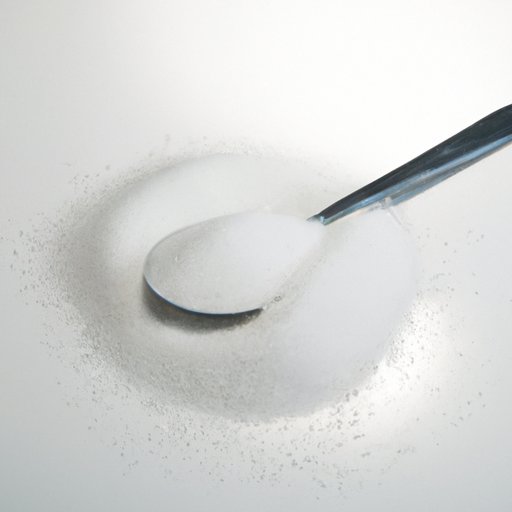Introduction
People who are looking for artificial sweeteners without erythritol might feel overwhelmed when trying to navigate the variety of options available in today’s market. This article seeks to provide a comprehensive guide to help readers understand which sweeteners contain erythritol and which do not, along with a brief overview of their benefits and drawbacks. By the end of this article, readers will be equipped with the knowledge to make informed choices when selecting sweeteners.
Erythritol in Artificial Sweeteners: A Comprehensive Guide
Erythritol is a low-calorie sugar alcohol that is often used in place of sugar in artificial sweeteners. It is commonly derived from plant sources and is a popular choice for sweeteners because it does not have a significant impact on blood sugar levels or insulin secretion. However, because it is a sugar alcohol, some people may experience gastrointestinal issues such as bloating or diarrhea when consuming large amounts.
Other popular types of sweeteners used in artificial sweeteners include aspartame, sucralose, and stevia. Aspartame and sucralose are both synthetic sweeteners that are highly processed and have been linked to potential health risks such as cancer and metabolic disorders in some studies. Stevia is a natural sweetener derived from the leaves of the stevia plant and is becoming more popular as a sweetener due to its zero-calorie count and natural origin.
The Skinny on Erythritol: Which Artificial Sweeteners Use It and Why
Many artificial sweeteners contain erythritol, either as the primary sweetener or as a secondary ingredient. This is due to its low calorie content, sweetness, and the fact that it does not have as strong of an aftertaste as other sugar alcohols. Manufacturers also choose erythritol because it is easier to use in cooking and baking than other sweeteners, making it a popular choice in sugar-free baking mixtures and pre-made products.
Seven Popular Artificial Sweeteners that Contain Erythritol
Seven popular brands of artificial sweeteners that contain erythritol include Swerve, Lakanto, Truvia Natural Sweetener, Monk Fruit In The Raw, So Nourished, Pyure Organic Stevia Sweetener, and NOW Foods Erythritol. These products are commonly used in cooking, baking, and as table sweeteners for coffee, tea, or other drinks. The amount of erythritol in each product varies but generally ranges from 70% to 100% erythritol.
Ditch the Sugar: Erythritol-Powered Artificial Sweeteners to Try
For those looking for alternative artificial sweeteners that do not contain erythritol, options include stevia, xylitol, allulose, and erythritol-free versions of the artificial sweeteners listed above. Stevia is a natural sweetener that has a slightly bitter aftertaste but is zero-calorie and has been shown to have no effect on blood sugar levels. Xylitol is another sugar alcohol that is derived from plant material and has a similar sweetness profile to sugar but can cause gastrointestinal distress in high amounts. Finally, allulose is a relatively new sweetener that is also low in calories and has been shown to have a minimal effect on blood sugar levels.
Erythritol’s Rise in Popularity: Which Artificial Sweeteners Use This ‘Magic’ Ingredient
Erythritol’s popularity is on the rise due to an increased interest in sugar-free and low-calorie options. This has led to the introduction of new products that use erythritol, such as sugar-free chocolate bars, ice creams, and candies. These new products are often marketed as healthier alternatives to traditional sweets and desserts. Some manufacturers have also started combining erythritol with other sugar alcohols or natural sweeteners to offer their customers a wider range of options.
A Deep Dive into Artificial Sweeteners with Erythritol: Which Brands Use It and Which Don’t
Major brands of artificial sweeteners that use erythritol include Truvia, Splenda, and So Nourished. However, there are also a wide range of erythritol-free options available on the market, such as Sweet’N Low, Equal, and NutraSweet. The decision to use erythritol or not is often based on a combination of factors, including taste, texture, cost, and availability of ingredients.
Sugar-free and Sweet: The Prominence of Erythritol in Artificial Sweeteners
Erythritol has become a prominent ingredient in many artificial sweeteners due to its low-calorie count and sweetness profile. While it does not have as long of a track record as other sweeteners, such as aspartame or saccharin, it is becoming more widely recognized as a useful alternative to sugar. Consumers looking for sweeteners that do not contain erythritol should be aware that there are many other options available, such as stevia, xylitol, and allulose, that can provide similar levels of sweetness without the possible gastrointestinal side effects.
Overall, consumers who are trying to make informed choices when selecting artificial sweeteners should research their options to find the best fit for their needs. Whether it is erythritol or another type of sweetener, understanding the benefits and drawbacks of each can help consumers make healthier choices and live a more fulfilling lifestyle.
